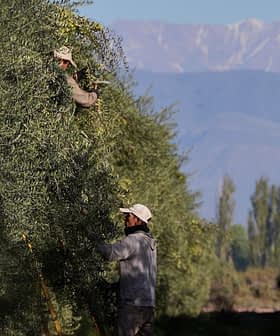Before the Flavored Oil Trend, There Was 'Agrumato'

The Ricci family has been producing Agrumato olive oil, a blend of Gentile olives and native citrus fruits, in Abruzzo, Italy since the 1980s, with the recipe kept secret within the family. Despite some controversy over the flavored oil category, Ricci and Beramendi have seen success with Agrumato, which has helped bring chefs and consumers into the olive oil world and is exported to numerous countries.
Widely considered a pioneer in the flavored olive oil category, the Ricci family has crafted Agrumato olive oil from Gentile olives and a range of native citrus fruit in the central Italian region of Abruzzo since the 1980s.
Francesco Ricci, whose family coined the term, insists that Agrumato is a registered trademark that describes their brand and is not a production method, an adjective, or a verb.
Agrumato was an important pillar of why people started to use extra virgin olive oil as a finishing oil.
“It’s a proprietary and secret recipe,” Ricci told Olive Oil Times through a translator, Rolando Beramendi, an award-winning importer and the founder of Manicaretti Italian Food Importers, who sells Agrumato in the United States. “For example, you will never know what’s in Campari or Coca-Cola.”
Unsurprisingly, Ricci declined to share many details about the process, which he spent much of the 1980s tweaking and fine-tuning before releasing the first Agrumato on the market after the 1989 harvest.
Instead, Ricci insisted that only immediate family members, including his children, know the recipe, whom he hopes will continue the Agrumato legacy.
See Also:Producer Profiles“It’s olives and lemons being crushed together and going through the same process as extra virgin olive oil,” he said, highlighting that Agrumato is made using dedicated milling equipment.
Ricci added that Gentile olives are key to Agrumato, as they are locally grown, have a mild flavor profile that does not clash with the citrus flavors, and ripen at around the same time as the citrus, allowing the company to harvest quickly and mill both fruits concurrently.
Along with lemon, the Ricci family sells Agrumato, made with orange, blood orange, bergamot orange, tangerine, citron, and lemon, along with herbs.
The secret to Agrumato’s success, which Beramendi said popularized the flavored olive oil category and has held up as the gold standard of its production, lies in the proportions.
“So everybody copied that, but imitation is the greatest form of flattery,” Beramendi said.
Indeed, searching for the term “agrumato method” in any mainstream search engine yields pages of olive oil producer websites, many of which are from California, where Agrumato was first imported by Beramendi in 1991. These websites describe a method of co-milling freshly harvested olives with a range of fresh fruits, vegetables, and herbs.
Beramendi and Ricci frequently send cease-and-desist notices for the incorrect use of the term, but this has not stopped some of the largest olive oil producers in the U.S. from publicizing “agrumato method” or “agrumato style” olive oil on their websites.
Part of the reason for the judicious protection of their intellectual property stems from the rigorous process the Ricci family had to undergo to have the product certified as extra virgin.
“When we first came out with the product and had to have it certified, I went to the University of Perugia… and had to fight quite a big battle to be certified extra virgin olive oil with lemon,” Ricci said. “The chemical analysis of the product shows it is 100 percent an extra virgin olive oil. It has aroma and a hint of flavor, but to all intents and purposes, it’s an extra virgin olive oil.”
According to the International Olive Council, any grade of olive oil, including extra virgin, is a single-ingredient food and cannot contain additives.
“Flavored oils cannot be considered olive oils,” and they cannot be labeled as such under IOC rules, former executive director Abdellatif Ghedira told Olive Oil Times in 2018.

Francesco Ricci frequently sends cease and desist notices, but this has not stopped large U.S. olive oil producers fromusing the brand name. (Photo: Agrumato)
Ricci and Beramendi disagree, pointing to the certification from the University of Perugia, and stated that they do not engage in debate over the nomenclature of flavored olive oil.
Instead, they point to public enthusiasm for the product as evidence that the name is just right, including awards in 2023 from the Specialty Food Association and the Fancy Food Show for the then-newly released Agrumato Bergamotto.
More broadly, Ricci explains that he believes flavored and infused olive oil are helping to bring chefs and regular consumers into the world of olive oil. Beramendi agreed, citing personal experience working with prominent chefs from leading California restaurants.
“I see it as a product that broke the glass ceiling,” he added. “Agrumato was an important pillar of why people started to use extra virgin olive oil as a finishing oil. It was a pioneer.”
Along with the U.S., the Ricci family exports Agrumato to 17 other countries. The United Kingdom is the second-largest market, with Australia, Germany, Japan, Singapore and South Korea also representing significant markets.
Ricci estimated that Agrumato sales account for approximately 95 percent of the business, with the remaining 5 percent comprised of sales of three monovarietal extra virgin olive oils and Pan’Agrumato, a panettone made with Agrumato.
With two recent reports forecasting that the flavored olive oil market will nearly double over the next decade, rising from $1.29 (€1.19) billion in 2024 to $2.47 (€2.10) billion by 2033, Ricci and his imitators are hoping to capitalize on the category’s momentum and continue to grow market share for Agrumato and other co-milled olive oil.







